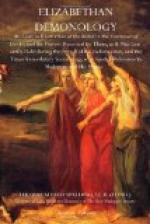58. But it is in “Hamlet” that the undecided state of opinion upon this subject is most clearly reflected; and hardly enough influence has been allowed to the doubts arising from this conflict of belief, as urgent or deterrent motives in the play, because this temporary condition of thought has been lost sight of. It is exceedingly interesting to note how frequently the characters who have to do with the apparition of the late King Hamlet alternate between the theories that it is a ghost and that it is a devil which they have seen. The whole subject has such an important bearing upon any attempt to estimate the character of Hamlet, that no excuse need be offered for once again traversing such well-trodden ground.
Horatio, it is true, is introduced to us in a state of determined scepticism; but this lasts for a few seconds only, vanishing upon the first entrance of the spectre, and never again appearing. His first inclination seems to be to the belief that he is the victim of a diabolical illusion; for he says—
“What art thou, that
usurp’st this time of night,
Together with that fair and
warlike form
In which the majesty of buried
Denmark
Did sometimes march?"[1]
And Marcellus seems to be of the same opinion, for immediately before, he exclaims—
“Thou art a scholar, speak to it, Horatio;”
having apparently the same idea as had Coachman Toby, in “The Night-Walker,” when he exclaims—
“Let’s call the
butler up, for he speaks Latin,
And that will daunt the devil."[2]
On the second appearance of the illusion, however, Horatio leans to the opinion that it is really the ghost of the late king that he sees, probably in consequence of the conversation that has taken place since the former visitation; and he now appeals to the ghost for information that may enable him to procure rest for his wandering soul. Again, during his interview with Hamlet, when he discloses the secret of the spectre’s appearance, though very guarded in his language, Horatio clearly intimates his conviction that he has seen the spirit of the late king.
[Footnote 1: I. i. 46.]
[Footnote 2: II. i.]
The same variation of opinion is visible in Hamlet himself; but, as might be expected, with much more frequent alternations. When first he hears Horatio’s story, he seems to incline to the belief that it must be the work of some diabolic agency:
“If it assume my noble
father’s person,
I’ll speak to it, though
hell itself should gape,
And bid me hold my peace;"[1]
although, characteristically, in almost the next line he exclaims—
“My father’s spirit in arms! All is not well,” etc.
This, too, seems to be the dominant idea in his mind when he is first brought face to face with the apparition and exclaims—




